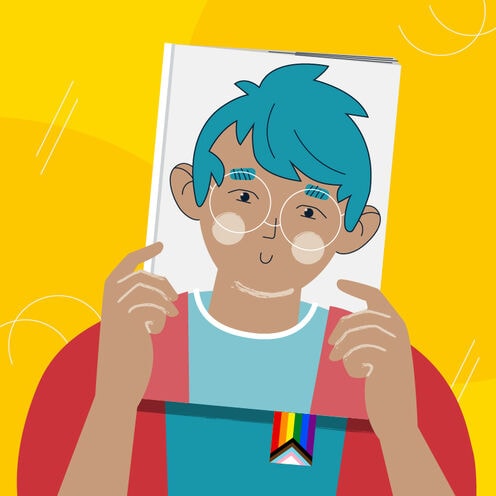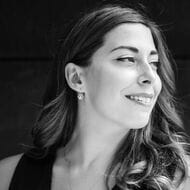
Writing Himself Into Existence: A Queer Iranian Immigrant Pens Stories About His Community
Abdi Nazemian experienced a lonely childhood as a gay immigrant from Iran. Now a popular author of young adult literature, he has devoted his career to telling stories that turn shame and stigma into a “legacy of love.”
“I don’t want any kid feeling invisible, or like the world doesn’t want them to exist,” said Abdi Nazemian, an award-winning young adult literature author, producer, and screenwriter.
He knows the feeling personally. As a child, Nazemian looked to the arts as his “escape and salvation,” but never saw a single protagonist in any book, film, or TV show who represented his identity, values, or experiences as a gay immigrant from Iran.
That’s why Nazemian has devoted his career to telling the stories he wishes he had access to as a child. His works include “Like a Love Story,” a novel about an Iranian boy grappling with his gay identity amid the AIDS crisis in 1980s New York City, which won the Stonewall Honor Award for Children's and Young Adult Literature in 2020.
In honor of Pride Month and National Immigrant Heritage Month in June, One Day spoke with Nazemian about how experiences and narratives from his community still remain untold or suppressed.
Nazemian also discusses the impact that book ban efforts could have on students and why it is so important for young people to have access to diverse media that reflects their identities, as well as stories that feature protagonists and heroes from other backgrounds.
You were born in Tehran and moved to Paris, then Toronto, and eventually spent much of your childhood in New York City. What role did books play in navigating your childhood, considering you grew up in several countries?
This is such an important question. The constant moving of my childhood is something I’m grateful for in many ways. It taught me multiple languages and gave me a global perspective on the world. But the lack of consistency, and the feeling of always being an outsider in a new culture, made it very hard to make friends. Before moving to the United States when I was 10, I was usually with my cousins, so I didn’t feel very alone. But in the suburbs of the United States, I was thrust into a new kind of loneliness. I felt deeply out of place and spent virtually all my free time immersed in storytelling. Books were a huge part of that. But so were movies (I’ve been obsessed with Old Hollywood films from the age of 10). And so were comic books, which are of course books. And so were television and music.
The arts were my escape and my salvation. In my opinion, stories are how we make sense of the world. They don’t just describe our lives, they save them. They don’t just give us facts about other humans, they teach us to empathize with them. I think the reason I’ve devoted my life to so many different forms of storytelling is that I know firsthand how stories can give us the tools we need to build our identity and find our voice in an often unforgiving world.
“In my opinion, stories are how we make sense of the world. They don’t just describe our lives, they save them. They don’t just give us facts about other humans, they teach us to empathize with them.”
Growing up, was it challenging to find books that featured protagonists who shared your identities—and how did that make you feel as a young person?
It wasn’t challenging—it was impossible. Those books didn’t exist. Growing up, there was no representation of me anywhere. Not being able to find myself in a single book, movie, or TV show made me feel like maybe I didn’t really exist, or at the very least like the world didn’t want me to exist. Thankfully, I found inspiration through artists who empowered me by shining a light on their own intersectional identity, no one more than James Baldwin, who is still my favorite author. The whole reason I started writing novels is because—after 10 years as a film and television writer—I couldn’t seem to get any of my queer, Iranian projects made.
When I had children, I realized I needed to create work that reflected my values and experience. I didn’t want my kids growing up thinking I wasn’t brave enough to tell my own stories. And so, I wrote myself into existence. I decided I had to tell stories about queer Iranians. Every book I’ve ever written, and I’m currently drafting my sixth, has in some way shined a light on queer Iranian identity. I don’t see that ever changing. There were zero stories about my identity when I was young. I want to flood the world with them. I don’t want any kid feeling invisible, or like the world doesn’t want them to exist.
Your award-winning novel "Like a Love Story" is a very personal story. Can you talk about what inspired you to write it?
"Like a Love Story" is a story I had been wanting to tell for so long before I finally found the words, the courage, the voice, and the vulnerability it took to put all those emotions on the page. I was too scared to tell the story for a long time. It’s hard to revisit the most difficult parts of our past, and this book deals directly with the fear and shame I felt coming of age as a gay Iranian immigrant to the United States at a time when all I knew of being gay were images of death and disease. Like Reza (the protagonist of “Like a Love Story”), I moved to New York with my family at a young age. While the book is fiction, the journey Reza takes is emotionally autobiographical. I was terrified of accepting my sexuality, and of AIDS. I didn’t think I’d survive. I couldn’t envision my life as a grown-up. But the writing process for this book had healing and magic in it. I don’t plot out my books. I let them come through me. I let the characters speak to me. And the delight of this book’s process was that a story that started out as an exploration of my shame and stigma became one about gratitude. I feel for all the people—friends, family artists, activists, and mentors—who helped me accept and love myself. Ultimately, it became a book about the love, unity, and heroism that conquered the fear and shame inside me.
The response to this book has also been healing. It’s a book about everything I was holding back out of shame for so long. To have it be embraced as it has feels like a reminder that I was never alone, even when it felt like I was. We’re all connected. Just a few days ago, a woman in Brazil posted a photo of her newly tattooed arm, marked with a quote from the book: “Love Is Our Legacy.” I suppose, in the end, that’s what inspired the book. I needed to take all that shame, stigma, and fear and turn it into a legacy of love.
There have been a number of efforts across the nation to ban “controversial” books—many of which are novels that reflect the lived experiences of authors from LGBTQ+ communities, immigrant communities, and communities of color. What do you think is the impact of banning books centered around these communities?
It breaks my heart. Just recently, I read an article about a school board meeting where parents read passages from "Like a Love Story" to prove it wasn’t fit for inclusion in school libraries. The message this sends is that being gay isn’t fit for inclusion in schools. That it’s shameful and must be eradicated. It’s a horrifying reality we’re dealing with, but it sadly doesn’t surprise me, because it’s how I grew up, with little access to queer media, queer joy, queer art.
When I think of the queer generation I grew up with, it’s often with a broken heart. Many of us found the tools to overcome our shame. I did, and I’m grateful every day for the miraculous life I have: a creative practice, a husband, and the most beautiful children in the world. It’s a miracle. But so many of my queer friends haven’t been as lucky. The number of queer friends I know who have died from overdose and suicide is shocking. It’s heartbreaking. And it’s hard for me to believe it’s not because of the lingering, horrible shame we were all made to feel. And it's still a huge problem. Queer kids are still at a far greater risk of suicide than straight kids.
That said, I want to point out that for all the talk of book bans, there is also something else happening in classrooms all over the county. Inspiring educators are bringing queer books into classrooms and initiating beautiful, healing discussions through those books. At this point, I’ve had countless classroom visits with students reading "Like a Love Story," many organized by the incredible Lambda Literary Foundation. These visits are so inspiring. The students are full of questions and curiosity, and so inspired as they learn about queer history. I wish anyone who wants to ban books could sit in on one of my classroom visits. I wish they could see the openness, the heart, the utterly crucial connection that happens when kids are taught not to feel ashamed of their questions, of who they are, and of who they might be.
Get more articles like this delivered to your inbox.
The monthly ‘One Day Today’ newsletter features our top stories, delivered straight to your in-box.
Content is loading...
This interview has been edited and condensed for clarity.
We want to hear your opinions! To submit an idea for an Opinion piece or offer feedback on this story, visit our Suggestion Box.
Sign up to receive articles like this in your inbox!
Thanks for signing up!
Content is loading...


